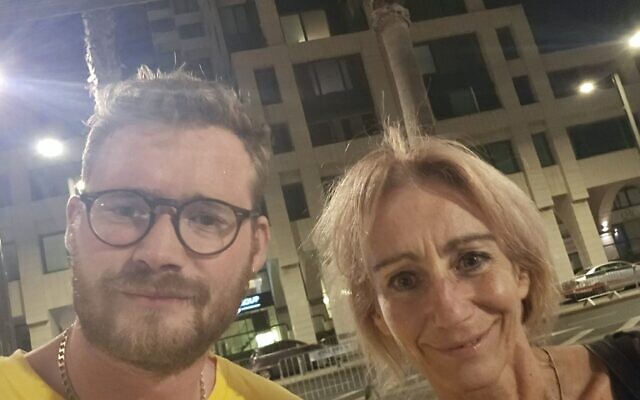Holiday in Tel Aviv turns into a mission for refugees from the massacre
Two Brits tell how they found themselves in a country at war, encountering people traumatised or lost – and in search of peace
Julie Russell, who teaches English to refugees, and Tom Waterton-Smith, a lawyer turned tattoo artist, travelled together to Tel Aviv last month to see how Israel has developed and, for Tom, to learn more about their Jewish heritage. They were there when Hamas committed the terrorist attack on 7 October. Stranded in the city in the aftermath, they spent time with evacuees from the south. This is their story.
Cinema Hotel reception, Tel Aviv, 8am, Saturday 7 October 2023. “We’re under attack,” said the receptionist. There’s been a massacre in the south. We really don’t know what’s happened. Please don’t go outside”.
This was the start of a horrifying day midway through a relaxing break in the sunshine of Tel Aviv. We are two friends from London who wanted a holiday in the sun, one of us fulfilling a long-held desire to witness changes to a country last visited 30 years ago, the other on a mission to discover more about his Jewish heritage.
We are aware of the complexities of Middle Eastern politics and the extraordinary reality of Israelis living under constant threat from a neighbour governed by a terrorist organisation with a publicly stated intention to wipe their country from the face of the earth. One of us had visited Gaza in the 1990s and was astounded by the poverty, crumbling buildings and general chaos, in stark contrast to the comparative wealth and order of Israel.
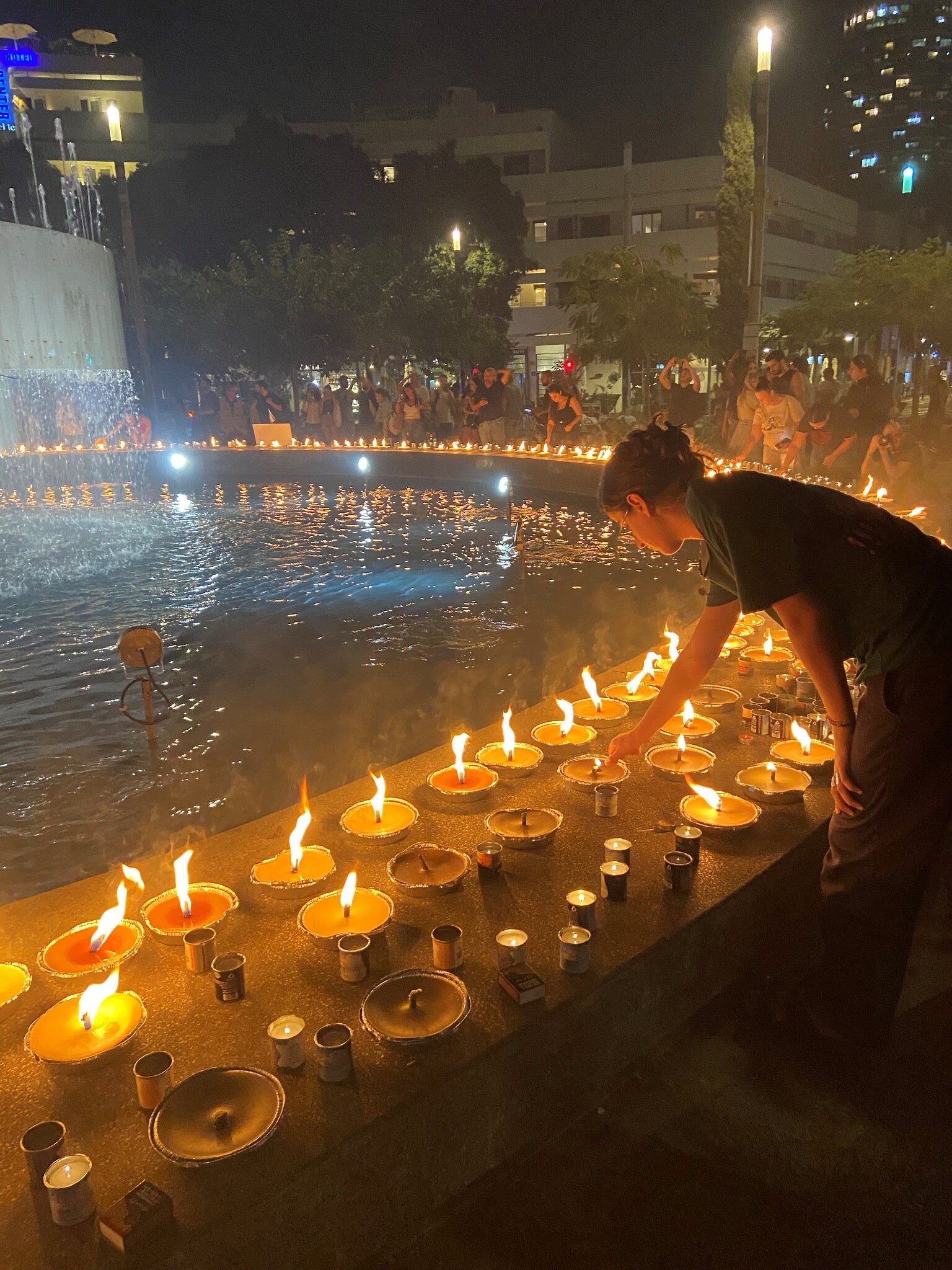
However, we’d visited the West Bank on the day before the attack and our Palestinian taxi driver, Yousef, had explained that, under the control of the Palestinian Authorities, the region had reached a relatively peaceful compromise that certainly worked for him. His pragmatism and acceptance that the past can’t be changed, and that the future seems promising, perhaps lulled us into a false sense of security as he drove us to see the ‘Flower Thrower’ artwork painted on the side of a garage wall near Bethlehem by British graffiti artist Banksy .
Less than 24 hours later, back in Tel Aviv, we were quickly learning the routine of relocating to mammads, the safe rooms located on every floor of our small hotel. As the sirens wailed, warning us that missiles fired from Gaza were directly overhead, we had roughly two minutes to make our way to rooms with reinforced windows and heavy metal doors where we’d wait for the booms that told us the rockets had been intercepted, at least on this occasion.
The hotel’s bedrooms were occupied by fellow tourists from Europe, the US and elsewhere, who for the most part reacted with confusion, trepidation and, in some cases, sheer blind fear. The hotel staff guided us to safety, calmly yet with evident apprehension.
By Sunday morning, news reports and social media screamed that we were in a country now at war. The true horror of what had happened, and indeed was continuing to happen, began to unfold.
We watched the efficiency with which the local population packed boxes of supplies for the defence forces. As some tourists flew home, their hotel rooms were reallocated to evacuees, mostly from the south of Israel. There were whole families living together in one room; the images on their cameras, taken as they fled their homes, were horrific. It was our privilege to listen to accounts of what our neighbours were enduring. These are some of their stories.
Pongo
Many of the shops in Tel Aviv closed after war was declared, either because they didn’t have safe rooms or because the staff were called away to defend their country. Pongo is a small shop on Dizengoff Street selling T-shirts and it opened briefly one afternoon. We chose a T-shirt with a poignant message: “Peace and Hope from Israel”. The shop owner asked if we were frightened. We said that we were saddened by the situation and sickened from seeing some terrible images of the massacre. “You haven’t seen the worst,” he said. “You won’t because we will not spread trauma in that way; if we do the terrorists win. Hamas extremists have raped children and murdered young people enjoying themselves at a music festival. An old lady I knew was killed. She was decapitated with a tool – I don’t know the word for it.”
It was a spade; his elderly friend was decapitated with a spade. He hugged us and thanked us for listening as he tried to hold back tears.
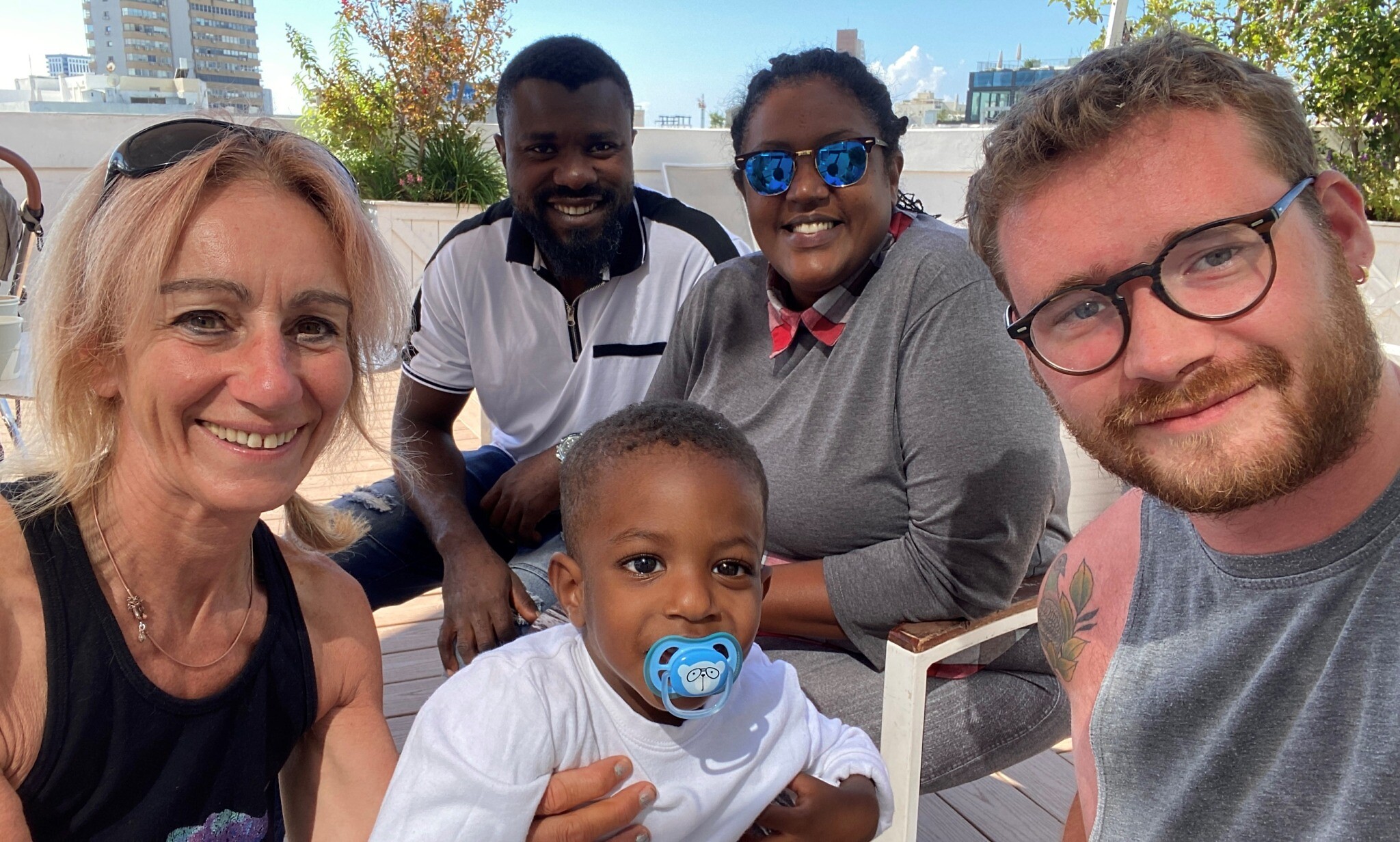
Ayala
Ayala is a Jewish woman of Ethiopian descent, married to a Nigerian man. Together with their two-year-old son Eliad, they had been evacuated from their home in Ashkelon. A charity arranged their relocation to our hotel and was paying for their stay. Ayala told us at she knew women who’d been raped by Hamas terrorists; the anguish with which she revealed this was heartbreaking. Two days later she said there was no more money to support her family in Tel Aviv and they would have to return to Ashkelon. She was afraid; they didn’t have a saferoom in their home and she believed that the Iron Dome Defence System was more effective over Tel Aviv than further south. Nevertheless, it was a tribute to her parenting skills that young Eliad believed he was on holiday and continued to smile as he looked up to the sky, even when sirens blared and the booms from detonated rockets blasted above us. Last we heard, additional funding had been secured for a few more days in Tel Aviv but their future is unknown.
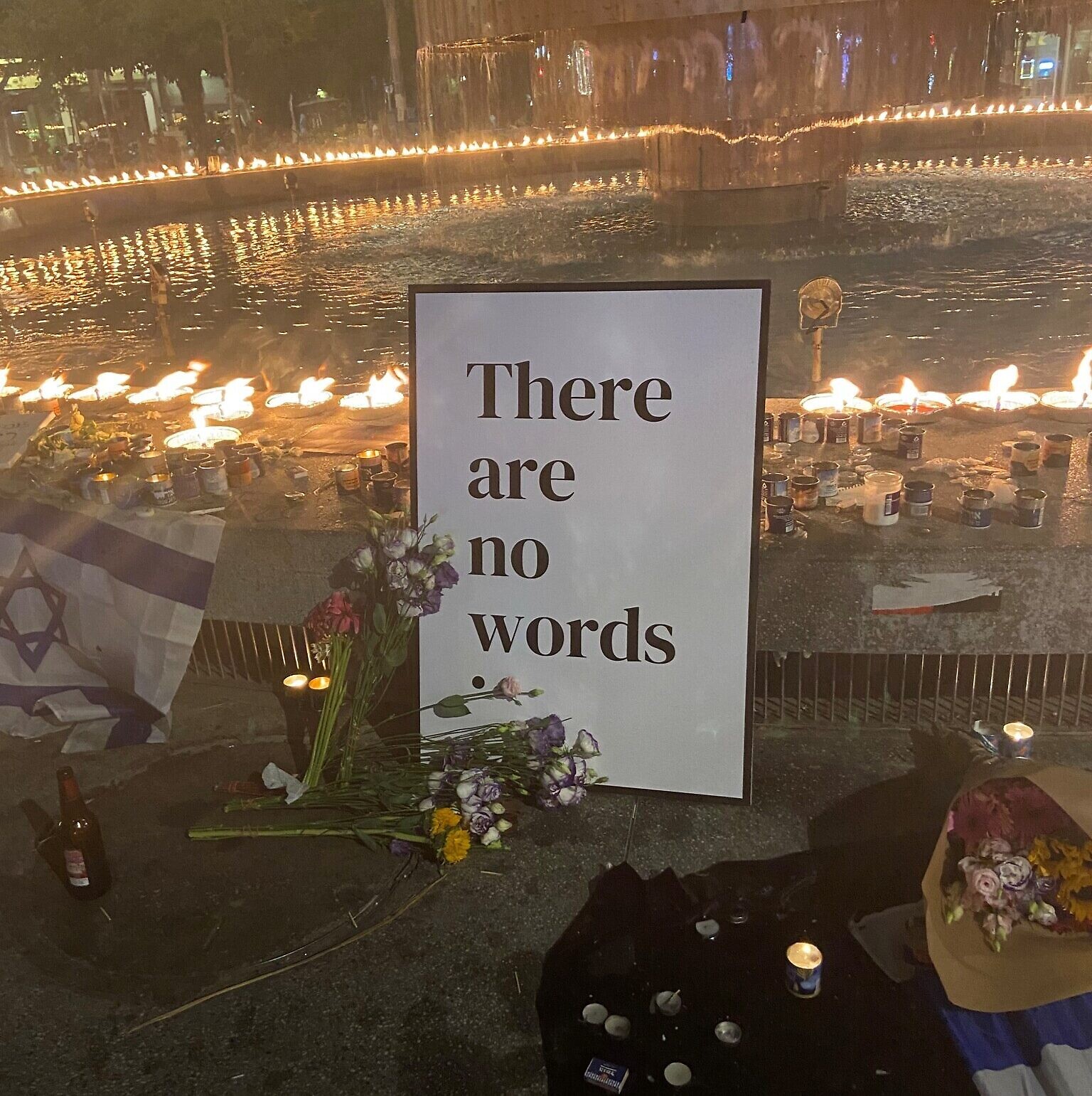
Overheard in Tel Aviv
Vigils in Dizengoff Square continued night after night. They were dignified and heartrendingly moving. We could feel the heat from the hundreds of lit candles surrounding the central fountain. Leonard Cohen’s Hallelujah was sung again and again, sometimes in English, sometimes in Hebrew, with a poignancy that we will always remember. Over the days that followed posters describing the hostages and the dead were placed on the benches.
A man sitting close to us was talking on his phone. “Why do they hate Israelis?” we heard him say, his voice breaking. “We never attack anyone; we must defend ourselves all the time. What’s wrong with the world? Our people have been massacred and tortured yet everyone’s talking about the situation in Palestine. Why doesn’t anyone care about us?”
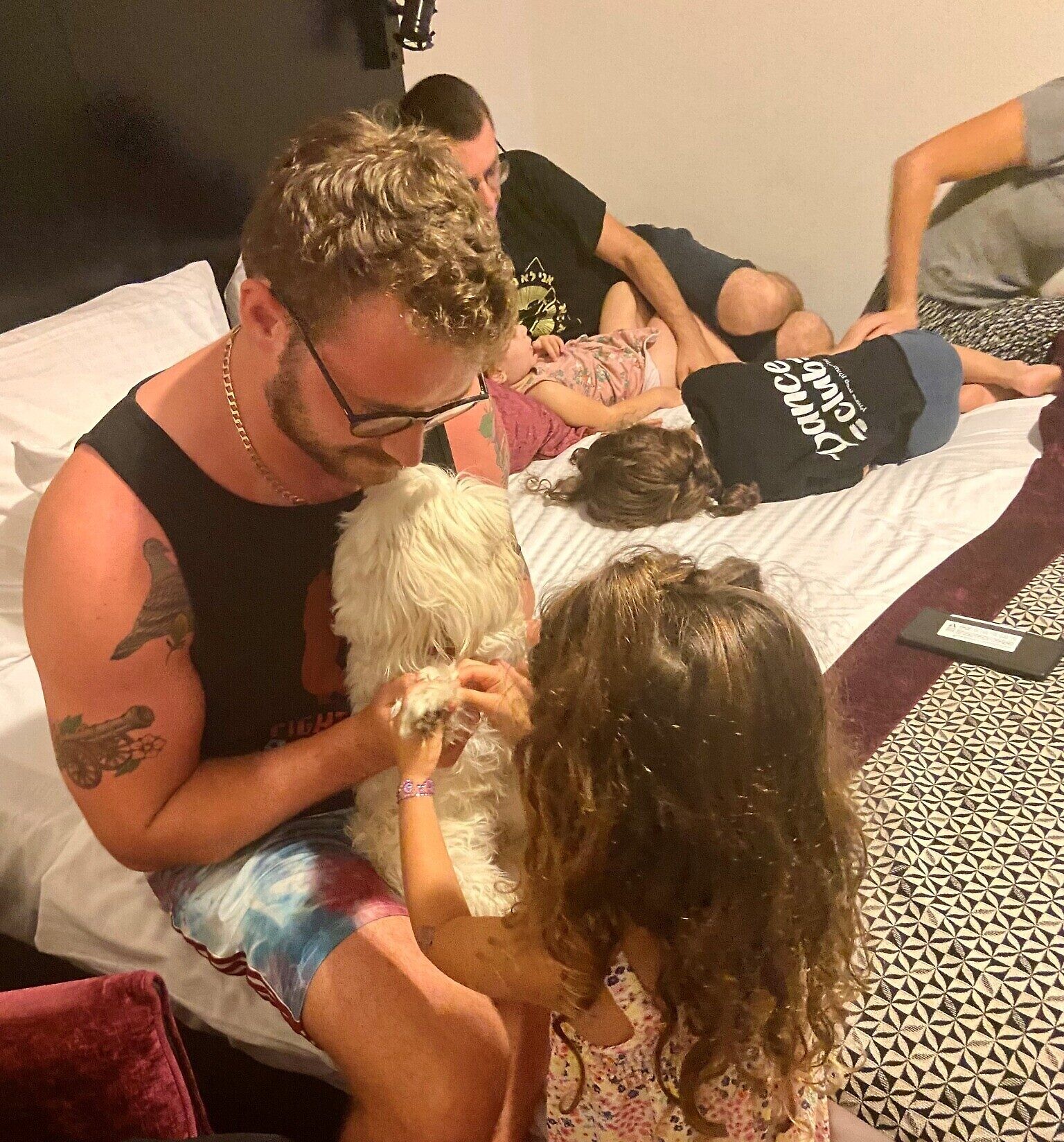
Rachel from a kibbutz
As the days following the massacre passed, the profile of the people in the area around our hotel began to change. There were more men wearing kippot and women dressed modestly. Families with lots of children looked slightly lost and out of place. Other groups came from some of the kibbutzim in the south and we spent some of our time entertaining their children. We met Rachel and her friend. They were evacuated from a kibbutz and told us: “We’re not too scared. This is normal for us. There are attacks on Israel every few years and we must defend ourselves. Our children learn about sirens and attacks from birth. We’re sorry that innocent Palestinians get hurt but Hamas won’t protect them. Hamas use them as human shields. Hamas controls everything in Palestine and they teach hatred of Israel. Most of us want a two-state solution but it’s difficult to see how it can work right now. We just want peace, acceptance of Israel and to stop being attacked.”
We are home now, still processing what happened to Israel and contemplating the future for some of those wonderful people we met. Not a single Israeli whom we spoke to wished harm or spoke ill of the Palestinian people but there can be no peace and no hope for Israel while Hamas exists and a hatred of Jews permeates so many societies.

Thank you for helping to make Jewish News the leading source of news and opinion for the UK Jewish community. Today we're asking for your invaluable help to continue putting our community first in everything we do.
For as little as £5 a month you can help sustain the vital work we do in celebrating and standing up for Jewish life in Britain.
Jewish News holds our community together and keeps us connected. Like a synagogue, it’s where people turn to feel part of something bigger. It also proudly shows the rest of Britain the vibrancy and rich culture of modern Jewish life.
You can make a quick and easy one-off or monthly contribution of £5, £10, £20 or any other sum you’re comfortable with.
100% of your donation will help us continue celebrating our community, in all its dynamic diversity...
Engaging
Being a community platform means so much more than producing a newspaper and website. One of our proudest roles is media partnering with our invaluable charities to amplify the outstanding work they do to help us all.
Celebrating
There’s no shortage of oys in the world but Jewish News takes every opportunity to celebrate the joys too, through projects like Night of Heroes, 40 Under 40 and other compelling countdowns that make the community kvell with pride.
Pioneering
In the first collaboration between media outlets from different faiths, Jewish News worked with British Muslim TV and Church Times to produce a list of young activists leading the way on interfaith understanding.
Campaigning
Royal Mail issued a stamp honouring Holocaust hero Sir Nicholas Winton after a Jewish News campaign attracted more than 100,000 backers. Jewish Newsalso produces special editions of the paper highlighting pressing issues including mental health and Holocaust remembrance.
Easy access
In an age when news is readily accessible, Jewish News provides high-quality content free online and offline, removing any financial barriers to connecting people.
Voice of our community to wider society
The Jewish News team regularly appears on TV, radio and on the pages of the national press to comment on stories about the Jewish community. Easy access to the paper on the streets of London also means Jewish News provides an invaluable window into the community for the country at large.
We hope you agree all this is worth preserving.


